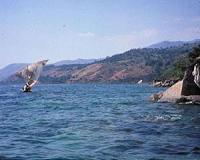| . |  |
. |
Panjwayi District, Afghanistan (AFP) July 26, 2010 Leading a patrol of Canadian soldiers, Sergeant Patrick Hogan inspects a deep well used to irrigate a patchwork of fields on the edge of the desert in southern Afghanistan. "It's good to be nosey," he said. "We've got to know what's normal because what's normal to them isn't necessarily normal to us." An Afghan farmer had risked being shot the previous night after the reconnaissance patrol spotted him working close to a culvert in the road. "The culverts are the problem because they're an easy fit for the IEDs and he was being suspicious around there," Master Corporal Rob Dynerowicz said, referring to improvised-explosive devices -- home-made bombs favoured by the Taliban. A warning flare was fired and the man recognised as a local farmer, although the troops had repeatedly warned against working near the culvert at night. The Canadians man an observation post in Panjwayi district, in the southwest of Kandahar province, to keep a close watch for militant activity, especially attempts to plant IEDs on the road. The district is known as the birthplace of the Taliban and was the scene of the Canadian-led Operation Medusa in 2006 which inflicted heavy losses on the militants, but failed to dislodge them from the province. Set up a couple of months ago, the observation posts aim to ensure freedom of movement for the military ahead of a push further into Taliban heartland which Captain Dominic Beharrysingh describes as the "wild, wild west". "Those are the places where the bad guys are living," he said. "We don't have freedom of movement there as of yet, but of course that's the next move that we want, towards the west," he said, with the Canadians due to pull out of Afghanistan next year. With jagged, rocky mountains, or "ghars", on one side, the observation post looks out across a dusty plain of irrigated fields towards the Dowrey river, beyond which the desert stretches to the border with Pakistan. "We're trying to provide security for the people of this region and the whole of the country, in a nutshell that's it," said patrol commander Hogan, of the 1st Royal Canadian Regiment Battle Group. "If you ask the locals, that's the phrase they use, the word 'security' -- everyone wants it," he said. But weighing security and the needs of local farmers poses a problem for the troops. Under a traditional system, each farmer is allotted a time in which to divert water to his fields via a vast network of wells and channels that stretches for tens of kilometres and allows agriculture in the desert environment, where temperatures hit 60 degrees Celsius (140 Fahrenheit). Canada is funding repairs to Kandahar's Dahla Dam and its irrigation system, the other main source of water for farmers in Panjwayi and neighbouring districts. Problems arise when a farmer needs to work at night or close to the road because it throws up the question if they really are just a farmer or if they are up to something more sinister. "They have like a timeshare for water -- that's the problem," said Dynerowicz following an argument with one young farmer. "I told him you can do what you like in your field but once you get close to the road, you can't do that as soon as the sun's down." "He wasn't happy," he said. Hogan, 39, said usually the locals would inform the soldiers if they had to farm at night. "It's a balancing act," he said of his role weighing the demands of the farmers against those of security. "For the most part they understand and they comply, they don't complain. I guess they're just getting tired of it," said Hogan. One morning an old farmer came down to talk with the soldiers, who had been hoping he would bring them some fresh naan bread to add variety to the ration packs they live off in the austere conditions "outside the wire". "I cannot give you bread because of the Taliban," he said, according to the patrol's translator. "When there is security, then I will invite you over and we will all be friends." Hogan said later: "He wanted to bring us bread but I guess he didn't want to get spotted doing that, being friendly with ISAF, because then it could mean repercussions for him, which is understandable." Despite fears of Taliban retribution and arguments over farming, Hogan said he believed the local Afghans were mostly supportive of the efforts by the NATO-led International Security Assistance Force. "If we can get them on board with us it'll make it easier for everyone, I think," he said.
Share This Article With Planet Earth
Related Links Water News - Science, Technology and Politics
 African lake warmest in 1,500 years
African lake warmest in 1,500 yearsProvidence, R.I. (UPI) Jul 21, 2010 Africa's Lake Tanganyika, the second-oldest and second-deepest lake on Earth, is warmer now than it has been in 1,500 years, scientists say. Experiencing unprecedented warming during the last century, the lake's surface waters are the warmest on record, LiveScience.com reported Wednesday. The warmer waters are linked to a decrease in the lake's productivity, affecting fish stocks ... read more |
|
| The content herein, unless otherwise known to be public domain, are Copyright 1995-2010 - SpaceDaily. AFP and UPI Wire Stories are copyright Agence France-Presse and United Press International. ESA Portal Reports are copyright European Space Agency. All NASA sourced material is public domain. Additional copyrights may apply in whole or part to other bona fide parties. Advertising does not imply endorsement,agreement or approval of any opinions, statements or information provided by SpaceDaily on any Web page published or hosted by SpaceDaily. Privacy Statement |